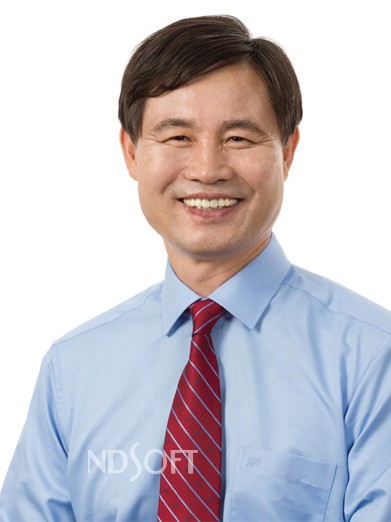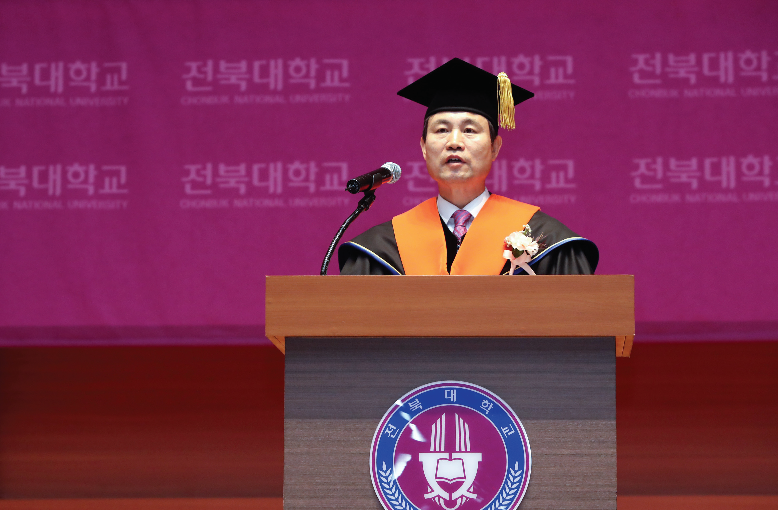Maestro Kim Dong-won Conducts The CBNU Orchestra
Yan Natalya, Reporter

“A University organization is similar to a large symphony orchestra. As president of this university, I will be like the ‘maestro,’ symphonic conductor, who is creative and considerate for a big orchestra.”
Kim Dong-won was recently inaugurated as CBNU President making a new great leap in CBNU. Attention is focusing on what innovations President Kim will bring to the university at the crisis time for finance and structural reforms due to the decreasing number of school-age population. We got answers to some questions, while getting to know the new president and his approach to CBNU recreation.
● At first, allow us to congratulate you on your recent inauguration! How do you feel about becoming the 18th president of CBNU?
I think this time the process of selecting a candidate for a president was very significant because it was the first democratic election in 70 years and students’ participation was ensured as full members of CBNU society. I will do my best to fulfill the wishes of those who supported me and to carry the pledge, which I made while campaigning and bore in mind a grain of criticism. Above all, I will do my job in a humble manner so that I will not forget my original intentions and priorities for becoming president of CBNU.
● You promote the slogan “Fruitful University, Warm Companion”. What is the meaning of this slogan?
‘Fruitful University' has the will to create a viable university by reorganizing and improving the organization and systems of university management. It includes attracting outstanding students and strengthening research competitiveness.
The ‘Warm Companion’ represents a commitment to create future values for universities through empathy, decentralization of power and convergence education. It will lay the groundwork for the next 100 years within not only CBNU, as a campus, but also the Jeollabuk region at large.
● Could you explain in detail your administration’s plan to push ahead in strengthening the status of flagship national university at the point of time when we are facing a critical situation in restructuring CBNU?
The current situation at CBNU is a deep crisis. The reasons are the structural reform of universities and the continuing financial deterioration caused by the sharp decline in the school-aged population. The government reduced an enrollment quota of about 56,000 students through university restructuring and college characterization projects. Most of these cuts have been made at local universities. This ultimately caused not only a financial burden to local universities, but also the double pain of sending outstanding students to the capital. If this continues, not only small and medium-sized universities, but also flagship national universities in region will be in trouble.
To overcome this crisis, I think the answer is to revitalize international exchanges, particularly with universities in Asia. We should form an "Asian University Education Alliance" to greatly increase the regular mutual exchanges between students and professors. Partial student exchanges between Korea, China and Japan will not meet future demands. Therefore, it needs to be noted in Southeast Asia, which has rapidly emerged as a land of opportunity since the late 20th century. A number of Korean companies are already moving their production bases from China to Vietnam, Malaysia and Indonesia, and in line with this, ASEAN countries are more eager to cooperate with Korea. The government's announcement of a New Southern Policy last year and the political community's emphasis on fostering a national university based on regional balance. If a flagship national university attracts excellent foreign students and professors, there will also be a green light for the admission of excellent Korean students to local universities.
CBNU has established deep exchange bonds with major universities in such countries as Indonesia, Malaysia and Singapore, having held or hosted international student camps twice a year for the last 5-6 years. Through exchanges Asia's top students and professors, many students' success stories are captured by enhancing their challenging spirit and sense of achievement. I think we can solve the problems we've accumulated thus far.
In addition, with the recent wave of Hallyu, the number of Asian students with a high level in Korean language is growing. We should also send Korean students overseas to promote academic and cultural exchanges. The vigorous exchange of students, the development of international education programs, and the expansion of international joint research can raise the status of local universities to international levels at a glance. Once flagship national universities are revived, small and medium-sized universities around them can also have successive revivals. If we progress towards this direction, educational links with institutes like California State University and California Community Colleges in the USA can also be formed naturally.

● What is your plan on the strengthening substantiality of the general education system?
At this point fusion and convergence are all the rage. In fact, those are taking place in many fields. But so far, that has not been the case in liberal arts education. As culture was only taught haphazardly, “the department store system” was focused on only one area and did not have diversity. Therefore, I believe that the basic knowledge acquired through liberal arts education, is failing.
To achieve the realization of liberal arts education, we plan to establish the College of Liberal Arts that can guarantee independence of the field. The existing Keunsaram Educational Development Institute will be reformed. From here, we will control all curricula of liberal arts education to establish solid ground where cross-disciplinary education may be conducted between science and engineering and the humanities and society. The current plan will include the development of the liberal arts education system to meet today’s requirements, a student-centered education policy and a classic reading certification system.
● What is a ‘Classic Reading Certification’?
Founded in 1890 by an oil conglomerate, the University of Chicago in the U.S.A. State of Illinois adopted the Chicago Plan in 1929, which required students to read 100 classic books. They would not let a student graduate if they had not read the books on the list. At first, the students protested, but as time went by, they lost their inferiority complex and gained confidence. Currently, the University of Chicago is one of the most prestigious universities in the world that can boast about having 89 Nobel Prize winners as alumna.
CBNU is going to adopt the Chicago Plan. We will give the opportunity to obtain the classic reading certification to students, who read more than 50 books for those in the humanities and social spheres and more than 25 classics for the science and engineering majors. The system is not new. It is and has already been used for many years by many universities in the United States and around the world for the students to gain a basic knowledge and develop important critical thinking skills. Only when the foundation is solid can you stand up upright.
● You had a huge support from the students. They have expectations about improvements of educational conditions, so what is going to change in the University’s support for students?
Student support is a departure from the cultivation of the Glocal talent. We will build a learning environment in the top-notch universities of the nation to increase students' satisfaction. First of all, CBNU’s education system will be reorganized mostly focusing on students as the priority. We plan to phase in a smart educational administration into the class enrollment system that will more broadly reflect the opinions of students and industries in the curriculum. Our new system will also expand participation of students' representatives in school committees. The environment of classrooms and toilets will also be significantly improved, as well as sports facilities, student assembly rooms and club rooms.
We will also strengthen measures to boost the employment rate. We will introduce a customized schooling track and expand the quantity of native English instructors for English lectures, let alone future career guidance and employment matching in preparation for the fourth industrial revolution. At the same time, we have planned programs to communicate with foreign exchange students and extend opportunities for overseas dispatch and volunteer work. The course is taken to reinforce the functions of the Office of International Cooperation to achieve all these goals.
● Do You have any standard when deciding what to do?
The most important principle is convergence. Steve Jobs created a new device, the current smartphone, by connecting and interpreting different things that had already existed. Depending on the power, connection and ability to change frames, innovation is possible and a competitive edge is also a factor. CBNU has solid competitive factors that are comparable to those of other universities in Korea. The outcome depends on how these secured competitive elements are linked and interpreted from a new perspective. Convergence will be an important principle for us to do everything in the future.
● What do you think is the image of a desirable CBNU student?
A glocal talented student develops abilities in a regional university and strives to make leading local companies into world corporations. I hope that our students will grow into people with the belief that the best local ones can become global ones. To this end, we will operate the so-called "Honor Student" development system, which is a system for nurturing outstanding human resources. In addition, we will establish an Asian University Education Alliance to lead the region and foster talents to the world, greatly expand the international joint degree system, and give students a "graphic leadership" to lead the region around the world through the Residential College.
● Finally, Do You Have Any Hopes or Aspirations?
I will meet everyone, who is aspired to develop CBNU, to have informal communication and I will make all the efforts to create a happy atmosphere in CBNU. I will devote myself to my obligations as a president and my mission towards research and education, and make a better CBNU, where diversity lives through qualitative growth and decentralization of authority. I will pursue a stratified change rather than a revolutionary transformation, and I will be faithful to my inner self rather than focusing on my appearance. We will not stop working toward becoming ‘The Best Glocal University’
It seems CBNU has a bright, promising future, which is only possible with the right kind of leader. CBNU Globe supports President Kim at the beginning of his journey as leader, maestro, of Chonbuk National University. Moreover, we are looking forward to becoming a part of improving our race for a better future CBNU.
GLOBE
globe@jbnu.ac.kr

